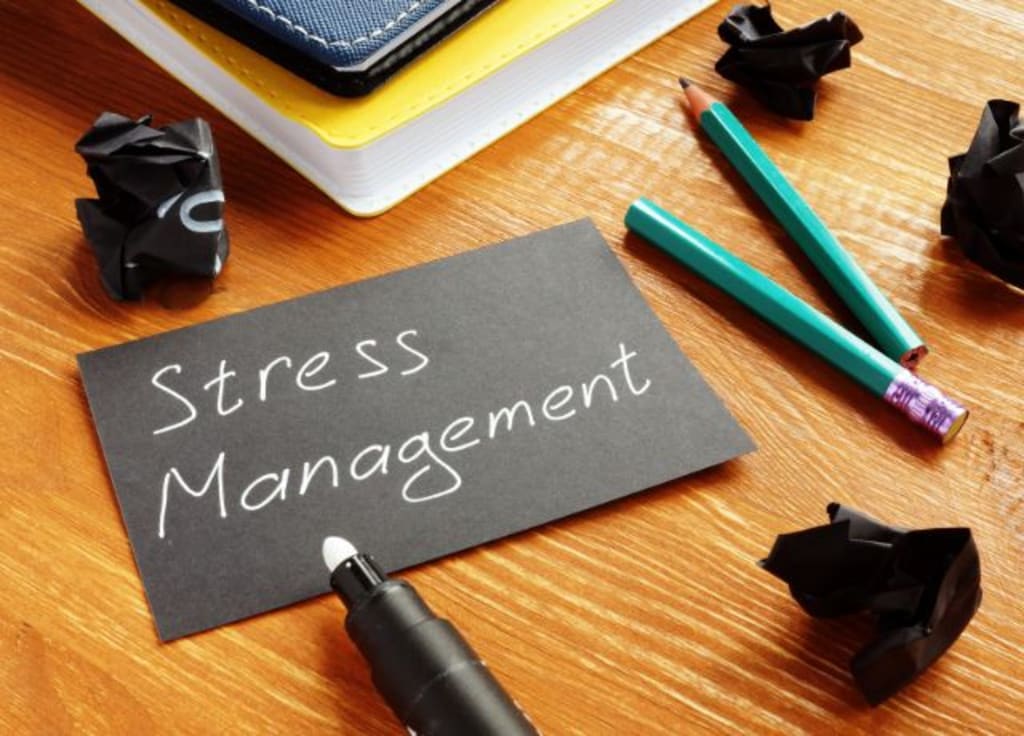Can Nootropics Tablets Help with Anxiety and Stress Management?
Nootropics can be a useful tool for stress and anxiety management. They function by supplying neuroprotection, regulating neurotransmitters, and strengthening the body's ability to withstand stress.

Anxiety and stress have become typical problems for many people in today's fast-paced society. These emotions can impair concentration, hurt the quality of sleep, and lower general life satisfaction. Although there are many ways to deal with these problems, taking nootropics tablets is one new way. But can these supplements for improving brain function aid in reducing stress and anxiety? We'll look at nootropics' definition, mechanisms of action, where to buy nootropics tablets, and possible advantages for stress and anxiety management in this blog.
Knowing About Stress and Anxiety
Explanation and Signs
Anxiety is defined by a spectrum of modest to severe feelings of concern, uneasiness, or fear. Contrarily, stress is the body's reaction to pressure from a specific circumstance or occurrence. There are many different ways that stress and anxiety can present themselves, such as:
- Restlessness or feeling "on edge"
- Weariness and depletion
- Trouble focusing or concentrating - Anger and mood fluctuations
- Headaches and tense muscles
- Sleep-related issues, like insomnia
Reasons and Initiators
Anxiety and stress have a variety of root causes, which can include:
Work Pressure: Conflicts at work, strict deadlines, and high expectations.
Money-related Concerns: Issues with bills, debt, and general stability of finances.
Health Issues: Unexpected medical issues, long-term diseases, and worries about one's or family's health.
Personal Relationships: Disagreements, miscommunications, and strains in friendships, family, or romantic relationships.
Long-term stress and anxiety can have a detrimental impact on one's physical and emotional well-being, increasing the risk of diseases, including depression, heart disease, and compromised immune systems.
Nootropics: What Are They?
Explanation and Groupings
Nootropics can boost brain function, known as "smart drugs" or cognitive enhancers. These drugs fall into the following general categories:
Natural Nootropics are naturally occurring chemicals, plant extracts, and herbs that have been proven to improve cognitive abilities. Ginseng, ginkgo biloba, and bacopa monnieri are a few examples.
Artificial Nootropics: These artificial substances were developed in labs to improve cognitive function. Racetams and some prescription drugs, such as modafinil, are two examples.
Regular Supplements
Several commonly used nootropics consist of:
Caffeine: Caffeine is present in tea and coffee and increases focus and alertness.
L-Theanine: An amino acid found in tea leaves, it helps people unwind and cope with stress without making them sleepy.
Rhodiola Rosea: An adaptogenic herb that lessens fatigue and aids in the body's adaptation to stress.
Nootropics for Stress and Anxiety Reduction
Action Mechanisms
Nootropics can reduce stress and anxiety in several ways.
Neurotransmitter Modulation: Dopamine and serotonin are two neurotransmitters that are important for mood and anxiety regulation. Nootropics can alter these neurotransmitters.
Neuroprotection: Several nootropics include antioxidant qualities that guard against oxidative stress and damage to brain tissue.
Adaptogenic Effects: Some nootropics, such as Rhodiola Rosea, assist the body in adapting to stress by regulating stress hormones and boosting resilience.
Primary Nootropics for Stress and Anxiety
1. L-Theanine: Well-known for encouraging calmness and lowering tension without inducing drowsiness. It raises serotonin, dopamine, and GABA levels—neurotransmitters that lessen anxiety and enhance mood.
2. Ashwagandha: This age-old herb, employed in Ayurvedic therapy, lowers the body's main stress hormone, cortisol. Studies have shown that it can dramatically lower tension and anxiety.
3. Rhodiola Rosea: This adaptogenic herb lessens mental tiredness and strengthens the body's ability to withstand stress. It functions by balancing cortisol and other stress-related chemicals.
4. Bacopa Monnieri: This herb lowers anxiety and enhances mental abilities, including memory and learning.
5. Magnesium: A vital mineral that helps lower tension and anxiety and maintains the health of the nervous system. Magnesium deficiency is frequently associated with elevated anxiety.
Research and Scientific Data
These nootropics are effective in treating stress and anxiety. As an illustration:
L-Theanine: Participants in a study published in "Nutritional Neuroscience" reported that L-Theanine dramatically increased attention and decreased stress.
Ashwagandha: Studies in clinical trials have shown that this herb can lower cortisol levels by as much as 30%, which in turn reduces anxiety and stress.
Rhodiola Rosea: Studies published in "Phytomedicine" revealed that taking Rhodiola Rosea supplements decreased fatigue symptoms and enhanced mental function in high-stress situations.
Using Nootropics to Manage Stress and Anxiety
Administering and Dosing
L-Theanine: 100–200 mg daily is the usual dosage.
Ashwagandha: 300–500 mg of standardized extracts are typically taken daily.
Rhodiola Rosea: 200–600 mg daily are the effective doses.
Bacopa Monnieri: 300 mg is the usual daily dosage.
Magnesium: 200–400 mg daily is the usual suggested dose, though this can vary.
Before beginning any new supplement, it is imperative to speak with a healthcare professional to establish the proper dosage and guarantee safety.
Combining Supplements
"Stacking," or combining nootropics, can intensify their benefits. For example:
L-Theanine and Caffeine: This duo is well-known for enhancing concentration and calming down without causing the jitters that come with caffeine alone.
Rhodiola Rosea and Ashwagandha: These adaptogens can be combined to offer a more well-rounded reaction to stress.
Scheduling and Regularity
Regular Use: To reap the rewards of nootropics, consistency is essential. They must be taken as prescribed regularly.
Optimal Times to Take: Adaptogens such as Rhodiola Rosea work best in the morning to coincide with the body's normal cortisol rhythm. L-theanine can be taken at any time of day.
Possible Hazards and Adverse Reactions
Regular Adverse Effects
Although nootropics are generally harmless, they may cause adverse effects like the following:
L-Theanine: Generally accepted, although some individuals may have slight headaches or vertigo.
Ashwagandha: Excessive dosages may result in sleepiness or stomach problems.
Rhodiola Rosea: Dry mouth and lightheadedness are possible adverse effects.
Medication Interactions
There are drug interactions with nootropics. As an illustration:
L-Theanine: May intensify sedative effects.
Ashwagandha: May interact with immunosuppressive drugs and thyroid medicines.
Avoidance Measures and Restrictions
Some people should not take certain nootropics, including: - Women who are pregnant or nursing. They should speak with their doctor before taking any nootropics.
People with medical conditions: People who have thyroid issues or autoimmune diseases should exercise caution when using adaptogens like ashwagandha.
Firsthand Accounts and Testimonials
Studies of Cases
Numerous individuals have reported favorable outcomes while utilizing nootropics to treat stress and anxiety. Here are a few instances:
Sarah's Story: College student Sarah discovered that taking L-Theanine before tests helped her remain composed and focused, which in turn helped her feel less anxious throughout tests.
John's Story: To reduce his stress at work, John, a busy professional, began taking ashwagandha. He claimed to have had more restful sleep and a more stable mood all day.
Achievement Stories
Sarah: "I used to get incredibly nervous before taking L-theanine during tests. I feel so much more at ease and have better attention now."
John: "In my experience, ashwagandha has changed the game. I am sleeping through the night and can manage stress better."
Final Thoughts
Nootropics can be a useful tool for stress and anxiety management. They function by supplying neuroprotection, regulating neurotransmitters, and strengthening the body's ability to withstand stress. It has been demonstrated that important nootropics like L-theanine, ashwagandha, and Rhodiola rosea reduce stress and anxiety.
Even while nootropics can be beneficial, managing stress and anxiety requires a comprehensive strategy. This entails leading a healthy lifestyle, working out frequently, and getting help from professionals when required.
To determine the best options for you, speak with a healthcare provider if you're thinking about using nootropics. Inquiries and experiences are welcome in the comments section below!
About the Creator
Enjoyed the story? Support the Creator.
Subscribe for free to receive all their stories in your feed. You could also pledge your support or give them a one-off tip, letting them know you appreciate their work.





Comments
There are no comments for this story
Be the first to respond and start the conversation.